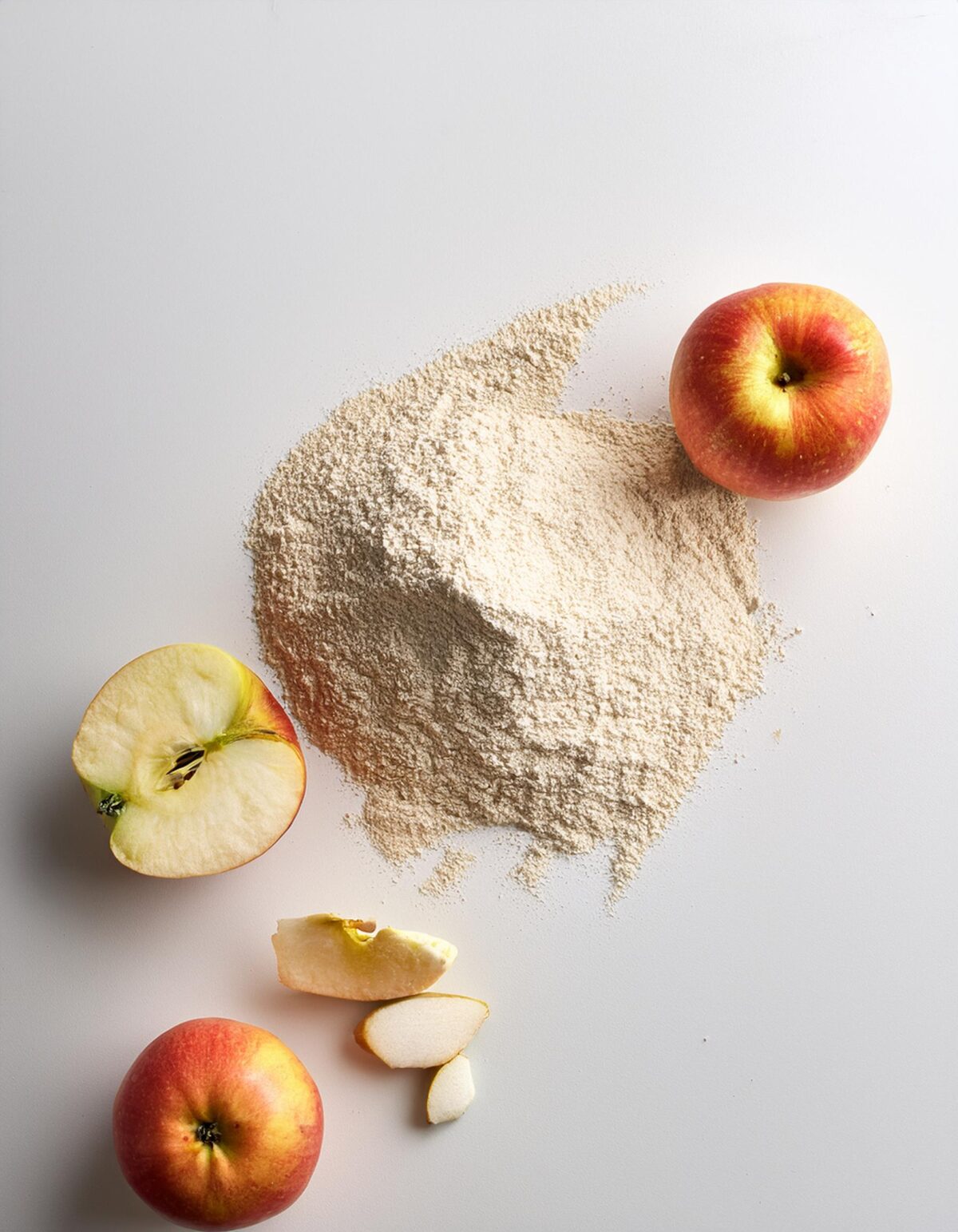Apple Bread
Ingredients
1 ½ cups apple flour
500 grams whole wheat flour
50 grams yeast
1 teaspoon salt
2 tablespoons olive oil
1 liter warm water
Olive oil for greasing the pan
Preparation
In a bowl, dissolve the yeast in ½ cup of warm water. Mix well and add 1 cup of warm water and 1 cup of wheat flour. Stir again, cover with a cloth, and let it sit in a warm place for 12 hours. The next morning, combine the remaining wheat flour with apple flour and salt in a large bowl. Make a well in the center and pour in the starter mixture, olive oil, and the rest of the warm water. Mix to form a dough. Knead by hand, adding more flour if the dough is too sticky or more warm water if it’s too dry. Whole wheat and apple dough requires more kneading than regular bread dough. When the dough is smooth, place it in a bowl, cover with a cloth, and let it rise in a warm place for about 2 hours. Once it has doubled in size, divide it and shape into loaves. Place them on an oiled surface, brush with olive oil or milk, and cover. Let rise in a warm place until doubled in size. Bake the loaves for 40-50 minutes at 180°C (350°F), or until lightly golden and hollow-sounding when tapped. Let the bread cool on a rack.
During World War II in Greece, especially in the winter of 1944/45, food shortages were likely the most significant problem. However, agricultural areas had some advantage over the rest of the country, as they could produce flour from dried fruits (apples, pears, figs, etc.) and dried vegetables and wild greens. During this period, apple bread became popular in apple-growing regions. Its main ingredient was apple flour, and yeast was used as a leavening agent, although sodium bicarbonate was occasionally used as well.
Recipe from: History of Greek Food
The Great Famine in Greece (Greek: Μεγάλος Λιμός)
During World War II, Greece faced a severe famine with several key causes. First, the occupying forces—Germans, Italians, and Bulgarians—implemented a brutal policy of pillaging, confiscating food, and controlling its distribution. The Allies’ naval blockade of Greece exacerbated the crisis by preventing food imports.
Another issue was the country’s destroyed infrastructure, which hindered effective transportation and supply. In cities like Athens, hyperinflation drove the prices of basic goods to unattainable levels, and the lack of food access led to mass starvation.
Hermann Göring’s contemptuous remarks about the starving illustrate the occupiers’ brutality: “This continuous concern for foreigners must end once and for all […] I don’t care if you say that people under your administration are starving. Let them die, as long as the Germans don’t starve.” In the winter of 1941/42, mortality rates reached catastrophic levels, and the daily sight of emaciated corpses on the streets of Athens was a horrifying reality. Overall, around 300,000 Greeks died from hunger and malnutrition during the occupation.
Laird Archer, working for an American aid agency, was in Athens when the Germans occupied the city on April 27, 1941. He recorded in his diary:
“April 28. […] The mass looting of Athens has begun.
First, they confiscated remaining food and fuel supplies. […] [A worker] found the entire market sealed with swastika signs. The Germans emptied all public fuel tanks. […] A farmer from Marathon, who came today to report that our nurses are safe in the mountains, said that his flocks of poultry, even pigeons, were shot with a machine gun, and swastika posts were set up at the four corners of the field. He was warned under threat of death not to take anything from the fields.
The invaders have been shipping meat, cattle, and sheep north of the city for days and have now seized dairy cattle around Athens for their own use. […] My friends at the Ministry of Agriculture estimate that national supplies of 200,000 tons could be reduced by one-third due to slaughtering.
Modern transport was seized along with food supplies. Syntagma Square is already filled with confiscated cars. […] They are also taking buses, especially trucks. […] Notices sent and broadcasted over the radio order the delivery of all bicycles to specified locations. Over five thousand were collected.
Wholesale and retail stores are systematically shut down. This is done through the polite method of “buying” with freshly printed occupation currency, worthless outside Greece. Early in the morning, all soldiers in Athens with nothing else to do received 100 such notes each. […] They were sent to shops to buy everything from women’s stockings to electronic equipment. They took their “purchases” to the post office or express train and immediately sent them home to the Reich. […] I saw a group of soldiers looting a small leather goods store, carrying new suitcases to a clothing store and leaving with them filled. The Eastman Kodak store was emptied of cameras. […] Major Greek industries are being seized. This is done through the same polite system of “buying” 60 percent of issued shares and hiring a German director.
Raw materials, metal, leather, and so on are being confiscated. Dozens of small factories, returned to their owners by mocking Germans as insignificant, now have no materials to process. […] Carpenters can’t get nails to continue the few construction works still underway. Even cement […] is no longer available.
Finally, hospital and pharmacy supplies are being taken. […]
The incredible speed and efficiency of this process leaves us stunned. We don’t know where to turn for the most essential items.”
Laird Archer: Balkan Journal. New York: WW Norton, 1944.

